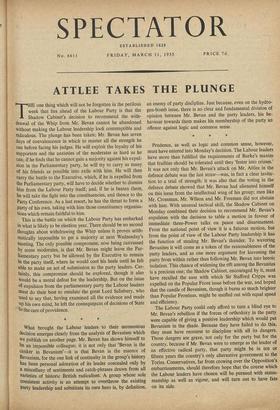ATTLEE TAKES THE PLUNGE
THE one thing which will not be forgotten in the perilous week that lies ahead of the Labour Party is that the Shadow Cabinet's decision to recommend the with- drawal of the Whip from Mr. Bevan cannot be abandoned Without making the Labour leadership look contemptible and ridiculous. The plunge has been taken; Mr. Bevan has seven days of convalescence in which to muster all the strength he can before facing his judges. He will exploit the loyalty of his supporters and the anxieties of the moderates as hard as he can; if he finds that he cannot gain a majority against his expul- sion in the Parliamentary party, he will try to carry as many of his friends as possible into exile with him. He will then carry the battle to the Executive, which, if he is expelled from the Parliamentary party, will have to decide whether to dismiss him from the Labour Party itself; and, if he is beaten there, he will take the fight into the constituencies, and thence to the Party Conference. As a last resort, he has the threat to form a Party of his own, taking with him those constituency organisa- tions which remain faithful to him.
. This is the battle on which the Labour Party has embarked In what is likely to be election year. There should be no second thoughts about withdrawing the Whip unless it proves arith- metically impossible to get a majority at next Wednesday's meeting. The only possible compromise, now being canvassed by some moderates, is that Mr. Bevan might leave the Par- liamentary party but be allowed by the Executive to remain In the party itself, where he would cool his heels until he felt able to make an act of submission to the party leaders. Cer- tainly, this compromise should be explored, though it also would be a moral defeat for the leadership. But on the issue of expulsion from the parliamentary party the Labour leaders must do their best to emulate the great Lord Salisbury, who used to say that, having examined all the evidence and made Up his own mind, he left the consequences of decisions of State to the care of providence.
What brought the Labour leaders to their momentous decision emerges clearly from the analysis of Bevanism which We publish on another page. Mr. Bevan has shown himself to be an impossible colleague; it is not only that 'Bevan is the canker in Bevanism'—it is that Bevan is the essence of Bevanism, for the one link of continuity in the group's history has been personal adoration of its leader concealed only by a miscellany of sentiments and catch-phrases drawn from all varieties of historic British radicalism. A group whose sole consistent activity is an attempt to overthrow the existing Party leadership and substitute its own hero is, by definition, an enemy of party disCipline. Just because, even on the hydro- gen-bomb issue, there is no clear and fundamental division of opinion between Mr. Bevan and the party leaders, his be- haviour towards them makes his membership of the party an offence against logic and common sense.
Prudence, as well as logic and common sense, however, must have entered into Monday's decision. The Labour leaders have more than fulfilled the requirements of Burke's maxim that frailties should be tolerated until they 'fester into crimes.' It was not only that Mr. Bevan's attack on Mr. Attlee in the defence debate was the last straw—was, in fact a clear invita- tion to a trial of strength; it was also that the voting in the defence debate showed that Mr. Bevan had alienated himself on this issue from the intellectual wing of his group; men like Mr. Crossman, Mr. Wilson and Mr. Freeman did not abstain with him. With unusual tactical skill, the Shadow Cabinet on Monday combined their decision to recommend Mr. Bevan's expulsion with the decision to table a motion in favour of immediate three-Power talks on peace and disarmament. From the national point of view it is a fatuous motion, but from the point of view of the Labour Party leadership it has the function of stealing Mr. Bevan's thunder. To wavering Bevanites it will come as a token of the reasonableness of the party leaders, and as one more argument for leavening the party from within rather than following Mr. Bevan into heroic isolation. This chance of widening the rift among the Bevanites is a precious one; the Shadow Cabinet, encouraged by it, must have recalled the ease with which Sir Stafford Cripps was expelled on the Popular Front issue before the war, and hoped that the candle of Bevanism, though it burns so much brighter than Popular Frontism, might be snuffed out with equal speed and efficiency.
The Labour Party could only afford to turn a blind eye to Mr. Bevan's rebellion if the forces of orthodoxy in the party were capable of giving a positive leadership which would put Bevanism in the shade. Because they have failed to do this, they must have recourse to discipline with all its dangers. Those dangers are grave, not only for the party but for the country, because if Mr. Bevan were to emerge as the leader of an effective radical party, that party might be in ten or fifteen years the country's only alternative government to the Tories. Conservatives, far from crowing over the Opposition's embarrassments, should therefore hope that the course which the Labour leaders have chosen will be pursued with states- manship as well as vigour, and will turn out to have fate on its side.










































 Previous page
Previous page